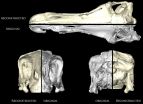Scientists uncover potential drug to tackle 'undruggable' fault in third of cancers
2014-11-05
(Press-News.org) SCIENTISTS have found a possible way to halt one of the most common faults in many types of cancer, according to research presented at the National Cancer Research Institute (NCRI) Cancer Conference in Liverpool today (Wednesday).
A team of scientists at the Max Planck Institute of Molecular Physiology in Germany has
uncovered a new strategy and new potential drug to target an important signalling protein in cells called Ras, which is faulty in a third of cancers.
When the Ras protein travels from the centre of a cell to the cell membrane, it becomes 'switched on' and sends signals which tell cells to grow and divide. Faulty versions of this protein cause too many of these signals to be produced – leading to cancer.
Scientists have been attempting for decades to target Ras, but with little success. The reason the protein is so difficult to target is because it lacks an obvious spot on its surface that potential drug molecules can fit into in order to switch it off, like a key closing a lock.
But now the researchers have shown that instead of directly targeting the faulty protein itself they can stop it moving to the surface of the cell by blocking another protein which transports Ras – preventing it from triggering cancer in the first place.
By targeting a link in the chain reaction that switches on the Ras protein, the scientists have opened opportunities to develop new treatments in the future.
Dr Herbert Waldmann at the Max Planck Institute of Molecular Physiology, said: "We've been scratching our heads for decades to find a solution to one of the oldest conundrums in cancer research. And we're excited to discover that it's actually possible to completely bypass this cancer-causing protein rather than attack it directly.
"We're making new improvements on compounds for potential drugs, although the challenge still lies in developing a treatment that exploits this discovery without ruining the workings of healthy cells."
Professor Matt Seymour, NCRI's clinical research director said: "This is an exciting approach to targeting one of the most common faults in cancer, which could lead to a new way of treating the disease. The research is still at a very early stage and it will be years before it can benefit patients but it is a key step forward in the field."
INFORMATION:
ELSE PRESS RELEASES FROM THIS DATE:
2014-11-05
PATIENTS with a specific type of oesophageal cancer survived longer when they were given the latest lung cancer drug, according to trial results being presented at the National Cancer Research Institute (NCRI) Cancer Conference today (Wednesday).
Up to one in six patients with oesophageal cancer were found to have EGFR duplication in their tumour cells and taking the drug gefitinib, which targets this fault, boosted their survival by up to six months, and sometimes beyond.
This is the first treatment for advanced oesophageal cancer shown to improve survival in patients ...
2014-11-05
SCIENTISTS have found a pattern of genetic 'switches' – chemical marks that turn genes on or off - that are linked to breast cancer's spread to the brain, according to research* presented at the National Cancer Research Institute Cancer Conference in Liverpool today (Wednesday).
The researchers, based at the University of Wolverhampton, studied 24 breast cancers that had spread to the brain, along with samples from the original breast tumour, and found a handful of genes with faulty switches.
Crucially, two of the genetic switches became faulty early on in the ...
2014-11-05
Everyone knows the scene: a basketball player at the free throw line, bouncing the ball as he concentrates on the basket. It's a tight game, and his team needs this point. He regularly makes baskets from much farther away while avoiding defenders, but now, when all is calm, he chokes and misses the basket, and his team loses. Recent research from The Johns Hopkins University suggests that in situations like this, performance depends on two factors: the framing of the incentive in terms of a loss or a gain, and a person's aversion to loss.
"We can measure someone's loss ...
2014-11-04
For years, scientists have debated how best to assess brain levels of oxytocin, a hormone implicated in social behaviors. Now, researchers at the Stanford University School of Medicine have found the first direct evidence in children that blood oxytocin measurements are tightly linked to levels of oxytocin in cerebrospinal fluid, which bathes the brain.
Low oxytocin levels in blood and CSF are both correlated to high anxiety levels, the research also showed. The findings will be published online Nov. 4 in Molecular Psychiatry.
"So many psychiatric disorders involve ...
2014-11-04
Fossils are usually deformed or incompletely preserved when they are found, after sometimes millions of years of fossilization processes. Consequently, fossils have to be studied very carefully to avoid damage, and are sometimes they are difficult to access, as they might be located in remote museum collections. An international team of scientists, led by Dr. Stephan Lautenschlager from the University of Bristol now solved some of these problems by using modern computer technology, as described in a recent issue of the Journal of Vertebrate Paleontology.
The team consisting ...
2014-11-04
In a study that included nearly 38,000 patients, those diagnosed with nonobstructive coronary artery disease (CAD) had a significantly increased risk of heart attack or death one year after diagnosis, according to a study in the November 5 issue of JAMA.
Nonobstructive coronary artery disease (CAD) is atherosclerotic plaque that would not be expected to obstruct blood flow or result in anginal symptoms (such as chest pain). Although such lesions are relatively common, occurring in 10 percent to 25 percent of patients undergoing coronary angiography, their presence has ...
2014-11-04
Among patients with metastatic melanoma, treatment with a combination of the drugs sargramostim plus ipilimumab, compared with ipilimumab alone, resulted in longer overall survival and lower toxicity, but no difference in progression-free survival, according to a study in the November 5 issue of JAMA.
F. Stephen Hodi, M.D., of the Dana-Farber Cancer Institute, Boston, and colleagues conducted a phase 2 clinical trial in which 245 patients with unresectable (unable to be removed by surgery) stage Ill or IV melanoma were randomly assigned to receive ipilimumab (intravenously) ...
2014-11-04
Testing of study participants who wore head-mounted display systems (Google glasses) found that the glasses created a partial peripheral vision obstruction, according to a study in the November 5 issue of JAMA.
Interest in wearable head-mounted display systems for general consumers is increasing, with multiple models in production. However, their effect on vision is largely unknown. Peripheral visual field is a main component of vision and essential for daily activities such as driving, pedestrian safety, and sports. Conventional spectacle frames can reduce visual field, ...
2014-11-04
BOSTON – Patients with metastatic melanoma who were treated with ipilimumab, an immune checkpoint blocker, survived 50 percent longer – a median 17.5 months vs. 12.7 months – if they simultaneously received an immune stimulant, according to a study led by Dana-Farber Cancer Institute scientists.
Patients in the clinical trial who got the combined therapies also had fewer serious adverse side effects than those who received only ipilimumab, the researchers report in the Journal of the American Medical Association.
The group treated with both ipilimumab ...
2014-11-04
San Diego — A recently developed Adeno-Associated Virus (AAV)-based medication has the potential to offer substantial protective effects for patients attempting to cease methamphetamine use. This research is being presented at the 2014 American Association of Pharmaceutical Scientists (AAPS) Annual Meeting and Exposition, the world's largest pharmaceutical sciences meeting, in San Diego, Nov. 2-6.
Methamphetamine, commonly referred to as meth, is an addictive substance that can cause brain damage, organ failure, stroke, open sores, rotting teeth, mania, paranoia, ...
LAST 30 PRESS RELEASES:
[Press-News.org] Scientists uncover potential drug to tackle 'undruggable' fault in third of cancers


